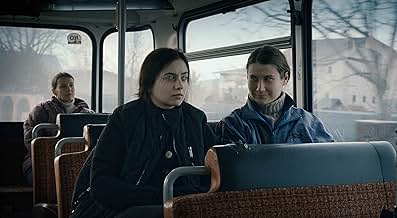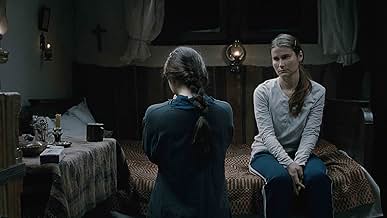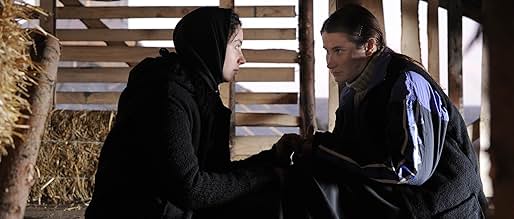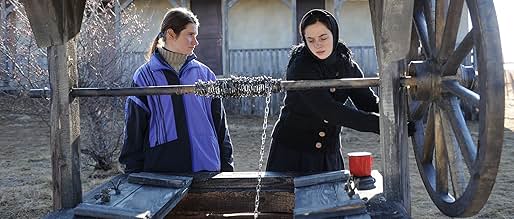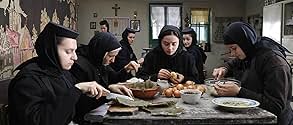IMDb RATING
7.5/10
14K
YOUR RATING
The friendship between two young women who grew up in the same orphanage; one has found refuge at a convent in Romania and refuses to leave with her friend, who now lives in Germany.The friendship between two young women who grew up in the same orphanage; one has found refuge at a convent in Romania and refuses to leave with her friend, who now lives in Germany.The friendship between two young women who grew up in the same orphanage; one has found refuge at a convent in Romania and refuses to leave with her friend, who now lives in Germany.
- Director
- Writers
- Stars
- Awards
- 8 wins & 19 nominations total
Valeriu Andriuta
- Priest
- (as Valeriu Andriutã)
- Director
- Writers
- All cast & crew
- Production, box office & more at IMDbPro
Featured reviews
The Romanian film Dupa Dealuri (2012) was shown in the U.S. with the title "Beyond the Hills." The movie was written and directed by Cristian Mungiu.
A better name for this film would have been "Beyond the City," because the movie takes place in a Romanian convent where conditions are basically medieval--no electricity, no running water, no central heating. Ironically, the convent overlooks a modern city. When anyone from the convent visits the city, we are jarred into remembering that the action is happening today, rather than 500 years ago. A group of nuns live in the convent, which is directed by an Orthodox priest and his wife, who is the mother superior.
Two young women grew up together in an orphanage, and then separated. One of the friends, (Volchita, played by Cosmina Stratan) has joined the convent. The other (Alina, played by Cristina Flutur) has gotten work in Germany. When Alina returns to visit Cosmina at the convent, the movie appears destined to be about a liberated woman freeing her more traditional friend from the repressive religious, patriarchal, atmosphere of the convent. That's not the direction the film takes.
We learn that Alina is desperate to be with Cosmina. She wants Cosmina to leave the convent and join her in Germany. It's Alina who is troubled. Cosmina is happy at the convent, and truly believes that Alina belongs there as well.
I assumed that the convent would be a place of repression and degradation, but that isn't the case. The life is hard, but the nuns are not mistreated, and they don't appear to have been brainwashed into accepting the strict rules set down by the priest (played by Valeriu Andriuta).
The interactions between the outsider--Alina--with Cosmina and the nuns and priest take turns and twists that I wouldn't have predicted. It's a hard, cold life at the convent, and this is a hard, cold portrayal of that life, and what happens when that life is disturbed.
Beyond the Hills is a grim, but fascinating, movie about good intentions meeting harsh reality. The acting and cinematography are superb. It's definitely worth seeking out and viewing.
We saw this film at the excellent Dryden Theatre at George Eastman House in Rochester. It will work well on DVD. Beyond the Hills was submitted as the Romanian entry in the 2013 Academy Awards Best Foreign Language Film category.
A better name for this film would have been "Beyond the City," because the movie takes place in a Romanian convent where conditions are basically medieval--no electricity, no running water, no central heating. Ironically, the convent overlooks a modern city. When anyone from the convent visits the city, we are jarred into remembering that the action is happening today, rather than 500 years ago. A group of nuns live in the convent, which is directed by an Orthodox priest and his wife, who is the mother superior.
Two young women grew up together in an orphanage, and then separated. One of the friends, (Volchita, played by Cosmina Stratan) has joined the convent. The other (Alina, played by Cristina Flutur) has gotten work in Germany. When Alina returns to visit Cosmina at the convent, the movie appears destined to be about a liberated woman freeing her more traditional friend from the repressive religious, patriarchal, atmosphere of the convent. That's not the direction the film takes.
We learn that Alina is desperate to be with Cosmina. She wants Cosmina to leave the convent and join her in Germany. It's Alina who is troubled. Cosmina is happy at the convent, and truly believes that Alina belongs there as well.
I assumed that the convent would be a place of repression and degradation, but that isn't the case. The life is hard, but the nuns are not mistreated, and they don't appear to have been brainwashed into accepting the strict rules set down by the priest (played by Valeriu Andriuta).
The interactions between the outsider--Alina--with Cosmina and the nuns and priest take turns and twists that I wouldn't have predicted. It's a hard, cold life at the convent, and this is a hard, cold portrayal of that life, and what happens when that life is disturbed.
Beyond the Hills is a grim, but fascinating, movie about good intentions meeting harsh reality. The acting and cinematography are superb. It's definitely worth seeking out and viewing.
We saw this film at the excellent Dryden Theatre at George Eastman House in Rochester. It will work well on DVD. Beyond the Hills was submitted as the Romanian entry in the 2013 Academy Awards Best Foreign Language Film category.
Mungiu has managed in his films a perfect balance between portraying specific Romanian social-cultural issues and in the same time rendering them universal for the public abroad. He touches some of the Romanian taboos like the Orthodox church and its often brainwash practises, the efficiency of God-like doctors or the dark side of some of the do-gooders in social aid and work. The irony is that while all the characters in the film proclaim often and loud that they are sympathetic towards the orphan girl they are also the authors of her greatest abuses , from financial rip off to medical neglect or physical restraint .The system itself is rejecting the poorest and most vulnerable young people as is pointed out throughout the film by the recurrent motif of 'we have nowhere to go' leaving them in the hands of an often merciless world .In the very best of tradition of the superstitious Christian Romanian culture the real problems are avoided as they will throw a negative light back on everyone so it is easiest to blame all on evil spirits .The last scene gives a great insight into an emotionally devoid society , when such individual drama will become another media circus headline.
'Based on a true story' – a phrase that can cover so many bases - is the slow-burning and languorous Romanian film Beyond the Hills.
Set predominantly in a monastery in a bleak and poverty-stricken district, it is a complex and multi-layered film revolving around two young women, Alina and Voichita. Previously childhood friends then lovers, their lives intertwine once more when Alina returns from working in Germany in an attempt to once more enter into a relationship with Voichita who has since taken Holy Orders and is living the chaste and extremely frugal life of a nun. The rekindling of the relationship was always doomed and as Alina's mental health deteriorates with the realisation that she will not achieve her objective, she provokes a series of events culminating in the belief by some that she is possessed and needs cleansing.
A Romanian film about faith, despair and unrequited lesbian love in an impoverished monastery was never likely to be an action-packed, sensationalist blockbuster. It is long at 155 minutes and its pace tends to alternate between dead slow and stop. It's the sort of a film which will take over 5 minutes to show a nun leaving the kitchen to draw water from the well and return to the kitchen with no dialogue or plot advancement throughout that period. But it is a film that has the courage to take its time, confident that it can draw you into the lives of the people whose story it tells. And on the whole it succeeds.
There are no real villains or heroes in the film. It does not take the easy route to mock and blame religion for out-dated belief – when a nun believes she has been sent a sign from God and goes all peculiar, the Orthodox Priest in charge cuts down the hysteria curtly and tells her and the other nuns to move on. No, the people shown in this film, be they doctors, police or those of the cloth, are portrayed as well-meaning individuals all looking to do no harm even if, like all of us, they can be judgmental and self-righteous on occasion. Beyond the Hills is an unashamedly bleak and ultimately very sad film which gives no answers but merely records events leaving its audience to draw their own conclusions.
Cinematography was good, though the constant sound of the ever-blowing wind was sometimes crude and off-putting.
And there was an early failure of the sub-titles. When Alina first arrives at the monastery, the camera concentrates on a hand-written sign at its entrance. It's clearly of some import for it to be shown so, but the audience is not let in on its message. Post-film research ascertained it stated, words to the effect: This is the House of God. Forbidden to those of different religion. You must believe and not doubt. It would have explained much.
Set predominantly in a monastery in a bleak and poverty-stricken district, it is a complex and multi-layered film revolving around two young women, Alina and Voichita. Previously childhood friends then lovers, their lives intertwine once more when Alina returns from working in Germany in an attempt to once more enter into a relationship with Voichita who has since taken Holy Orders and is living the chaste and extremely frugal life of a nun. The rekindling of the relationship was always doomed and as Alina's mental health deteriorates with the realisation that she will not achieve her objective, she provokes a series of events culminating in the belief by some that she is possessed and needs cleansing.
A Romanian film about faith, despair and unrequited lesbian love in an impoverished monastery was never likely to be an action-packed, sensationalist blockbuster. It is long at 155 minutes and its pace tends to alternate between dead slow and stop. It's the sort of a film which will take over 5 minutes to show a nun leaving the kitchen to draw water from the well and return to the kitchen with no dialogue or plot advancement throughout that period. But it is a film that has the courage to take its time, confident that it can draw you into the lives of the people whose story it tells. And on the whole it succeeds.
There are no real villains or heroes in the film. It does not take the easy route to mock and blame religion for out-dated belief – when a nun believes she has been sent a sign from God and goes all peculiar, the Orthodox Priest in charge cuts down the hysteria curtly and tells her and the other nuns to move on. No, the people shown in this film, be they doctors, police or those of the cloth, are portrayed as well-meaning individuals all looking to do no harm even if, like all of us, they can be judgmental and self-righteous on occasion. Beyond the Hills is an unashamedly bleak and ultimately very sad film which gives no answers but merely records events leaving its audience to draw their own conclusions.
Cinematography was good, though the constant sound of the ever-blowing wind was sometimes crude and off-putting.
And there was an early failure of the sub-titles. When Alina first arrives at the monastery, the camera concentrates on a hand-written sign at its entrance. It's clearly of some import for it to be shown so, but the audience is not let in on its message. Post-film research ascertained it stated, words to the effect: This is the House of God. Forbidden to those of different religion. You must believe and not doubt. It would have explained much.
It is a sad story told in a fair way. You see the two characters desperately trying to save each other, but also desperately trying to keep themselves into the "safe bubble" they created around them: Voichita's bubble is the monastery, Alina's bubble is Voichita, the only human being that ever loved her.
It is the story of two girls who grew up in an orphanage (I felt a shiver trying to imagine it) and had few choices at the moment they became adults. The movie lefts many questions open. One of them, the hardest perhaps, is how was it possible that nobody (monastery, hospital, school, foster family, police, etc.) was able to help a girl, while everybody agreed on the fact that she needed help.
It is the story of two girls who grew up in an orphanage (I felt a shiver trying to imagine it) and had few choices at the moment they became adults. The movie lefts many questions open. One of them, the hardest perhaps, is how was it possible that nobody (monastery, hospital, school, foster family, police, etc.) was able to help a girl, while everybody agreed on the fact that she needed help.
A girl visits a convent to try and bring her friend home.
Starring Cosmina Stratan and Cristina Flutur.
Written by Cristian Mungiu. Inspired by the Non Fiction Novels of Tatiana Niculescu Bran.
Directed by Cristian Mungiu.
This is a dark and disturbing movie that would have been far better if it wasn't so slow paced.
It moves at a snails pace but maybe that's what Cristian Mungiu intended, after all I'm guessing that's how things flow in a convent. The story isn't bad and as far as I could tell ( this was a Romanian movie with English subtitles) the acting was okay without being incredible.
I liked the outside location cinematography but the indoor stuff looked a bit wobbly. This is an arty film and usually I like anything like this but for me this was too slow and bordering on boring. For me it lacked something but I'm not sure what. Maybe the relationship between the two main characters could have been explored more to make this more watchable? We only get a few suggestions of a love affair in the past between them both and so perhaps that's what this movie needed.
It does make you think. It's pretty much an anti religious movie and that's the message that came across clearly at the end.
7/10
Starring Cosmina Stratan and Cristina Flutur.
Written by Cristian Mungiu. Inspired by the Non Fiction Novels of Tatiana Niculescu Bran.
Directed by Cristian Mungiu.
This is a dark and disturbing movie that would have been far better if it wasn't so slow paced.
It moves at a snails pace but maybe that's what Cristian Mungiu intended, after all I'm guessing that's how things flow in a convent. The story isn't bad and as far as I could tell ( this was a Romanian movie with English subtitles) the acting was okay without being incredible.
I liked the outside location cinematography but the indoor stuff looked a bit wobbly. This is an arty film and usually I like anything like this but for me this was too slow and bordering on boring. For me it lacked something but I'm not sure what. Maybe the relationship between the two main characters could have been explored more to make this more watchable? We only get a few suggestions of a love affair in the past between them both and so perhaps that's what this movie needed.
It does make you think. It's pretty much an anti religious movie and that's the message that came across clearly at the end.
7/10
Did you know
- TriviaFilmed and edited simultaneously in chronological order.
- ConnectionsFeatured in At the Movies: Cannes Film Festival 2012 (2012)
- How long is Beyond the Hills?Powered by Alexa
Details
- Release date
- Countries of origin
- Official sites
- Language
- Also known as
- Beyond the Hills
- Filming locations
- Campina, Romania(location)
- Production companies
- See more company credits at IMDbPro
Box office
- Gross US & Canada
- $124,919
- Opening weekend US & Canada
- $14,622
- Mar 10, 2013
- Gross worldwide
- $673,493
- Runtime2 hours 32 minutes
- Color
- Sound mix
- Aspect ratio
- 2.35 : 1
Contribute to this page
Suggest an edit or add missing content



